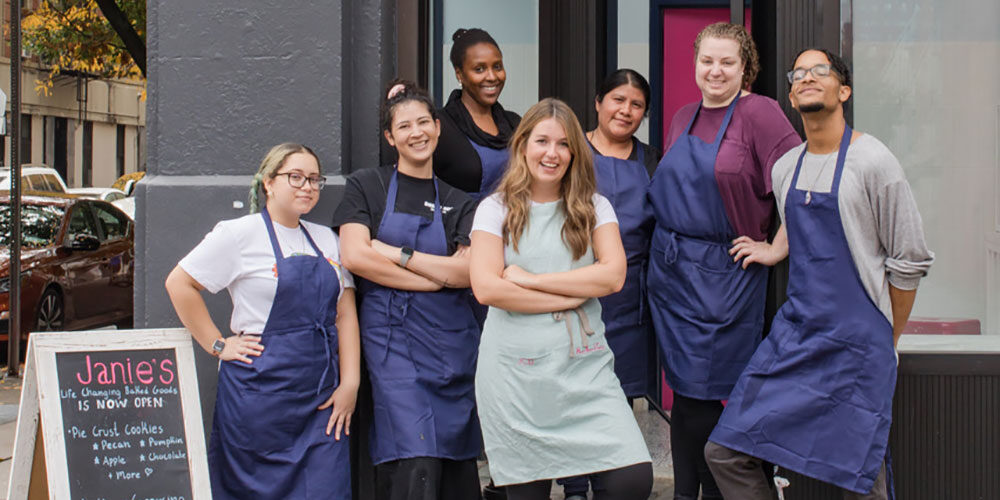From addict to entrepreneur

Deegan sometimes taps her theater training while engaging with staff and customers. (Image courtesy of Janie Deegan.)
The anxiety that led Janie Deegan, BFA ’09, to addiction took hold when she was just 3 or 4 years old.
“My first memories are of just being overwhelmed,” she says. “Just always in my head, always felt alone even in a roomful of people, just never felt like I fit in.”
As Deegan grew older, she found ways to cope.
“I always had friends, my grades never suffered, I was never a problem child, I was a rules follower,” she recalls. “I felt it was really important to mask the anxiety. I really don’t know where that notion came from.”
Then in high school, Deegan developed a taste for alcohol and drugs.
“I thought, ‘This is such a relief,’” she says. “It took away the anxiety and it just made me feel funnier and prettier and more alive. It was really like medicine in that way. It was like, alcohol and drugs saved me at a young age — until they really destroyed me.”
Now more than a decade sober, Deegan owns Janie’s Life-Changing Baked Goods, a business with three shops in her native New York City that produces more than $1 million in revenue. She credits part of her success to becoming “malleable” while earning her BFA in theater performance at Michigan.
“Part of the business is telling my story. You can be happy and successful and sober. It’s possible.”
The breaking point

Janie’s Life-Changing Baked Goods welcomes employees who have experienced homelessness, addiction, or incarceration. (Image courtesy of Janie Deegan.)
Baking and nightly family dinners at home were a big part of growing up with two theatrical design parents and an older brother on Manhattan’s Upper West Side. Meal-making was also a staple in Deegan’s extended family.
“Everything in my family revolved around food as a way to connect,” she recalls. “I can’t remember one time eating out with my extended family. Why would we eat out when we can cook such a delicious meal together?”
Starting at Michigan at 17, Deegan was the girl who made pasta in her dorm room or brined a turkey in a trash can in her apartment. Sharing food eased her social anxiety.
But as Deegen progressed through school, she drank several nights per week; it was socially acceptable to aim to drink until blacking out. Senior year “was the first time when I was like, ‘maybe there are consequences.’
“I remember journaling one night that I think I had fun, but I don’t even remember.”
Deegan finished her degree and thought she’d pursue a career in theater. But even to create a résumé, “I didn’t know how to put one foot in front of the other to make that happen. I was just paralyzed with fear all the time.”
Back in New York, drinking was a nightly routine and she popped pills more often.
“I was so young, I was like, I can’t be an addict, I can’t be an alcoholic.”
But she went homeless for nine months, sleeping on the streets, on trains, or in shelters. Finally, she tried rehab and eventually, at age 25 in 2013, it worked.
“I reached a breaking point. I knew that complete sobriety was the answer for me.”
Baking it forward
Deegan restarted her life with a job doing maintenance in apartment buildings. “It was amazing to have such a basic humble job,” she says about taking out the trash at 5 a.m. “It was a gift.”
Soon she started baking cookies and pies for friends, and then selling them. “My life was so out of control and baking is such a controlled science,” she says.
Her goods became so popular that in 2015 she opened Janie’s Life-Changing Baked Goods, which now employs 25 people, including some who have experienced homelessness, addiction, or incarceration. “It’s who you show up today as,” she says.
“I am one of the hardest workers you’ll ever meet,” she continues. “Even if I don’t know what the end goal is, I’m always going to get there. I’m really scrappy, because I had to climb a mountain to get out of the darkness. So, why wouldn’t people with similar experiences have the will to push forward?”
Deegan credits her theater studies for helping her be a good boss.
“I don’t know how I got into that program, but I feel so lucky that I did get in,” she says. “It was basically like theater boot camp. Everything you learn in theater, you can apply to life.”There was learning how to interact effectively with people.
“It made me a really good salesperson. Not in a cunning way, but I know how to talk to people. I know how to weave the result that I want.”
And there was what Deegan calls malleability, “one of my best assets,” that she gained from her theater studies. “I’m willing to go in different directions and see what the best course of action is. I’m a pretty good leader and not in a CEO way, but more in a gentle way.”
An eye on Ann Arbor
Deegan regrets that the Janie she is now didn’t get to experience Ann Arbor, where she hopes to open a fourth shop.
She has advice for young women who might be experiencing the anxiety or addiction that she did.
“Doing something that scares me builds character and makes me respect myself,” she says. “I was paralyzed by fear for so long all through high school and college, the fear of I’m not good enough. That completely paralyzed me.
“Now I don’t let that stop me anymore. It’s like a muscle. The more you practice, the easier it gets. Now, things that scared me don’t scare me anymore.
“Look fear in the face and do it anyway.”
(Lead image of the crew at one of three Janie’s Life-Changing Baked Goods locations is courtesy of Janie Deegan.)






Dilek Kirca
What a wonderfully inspirational story! “I had to climb a mountain to get out of the darkness” speaks volumes.
I sincerely hope you decide to open a shop in Ann Arbor and experience it in a new way.
Reply